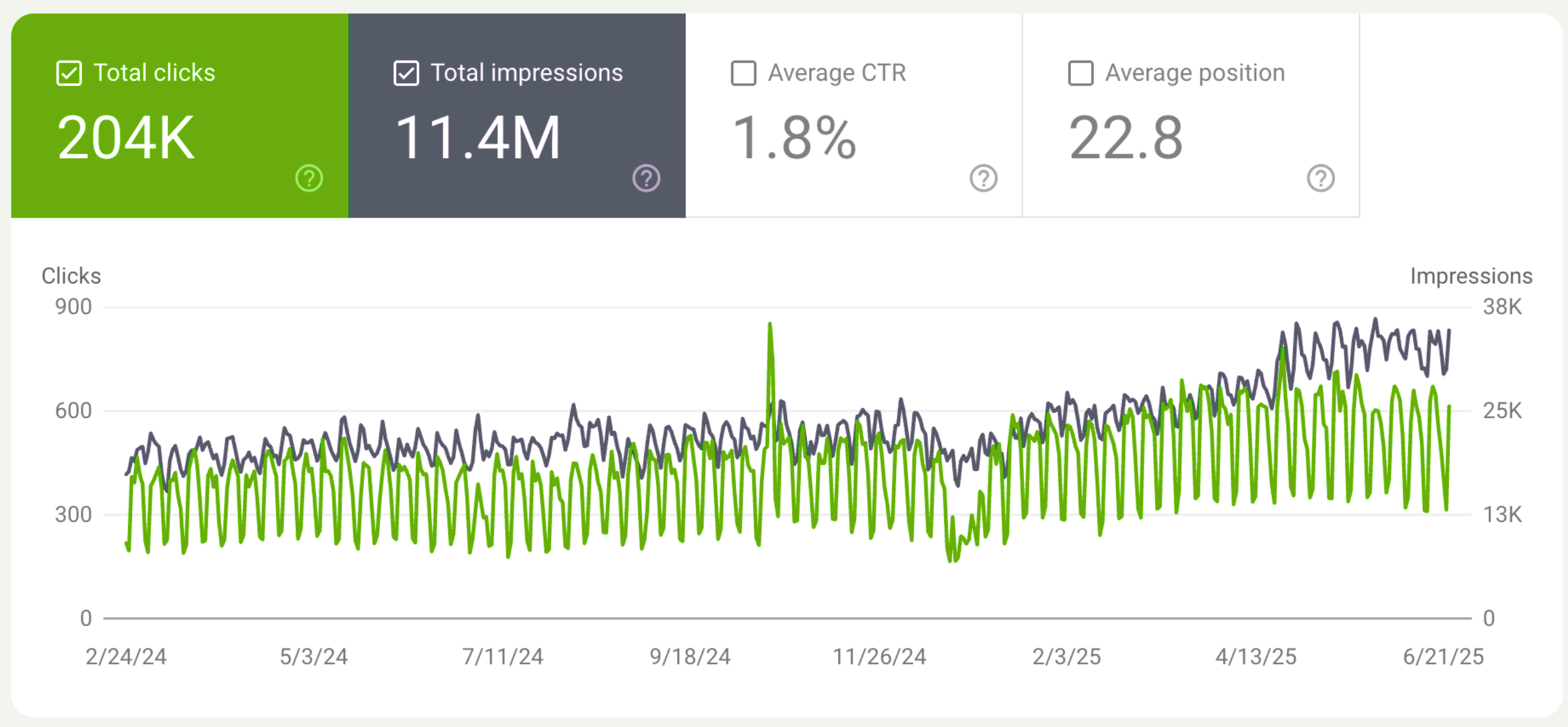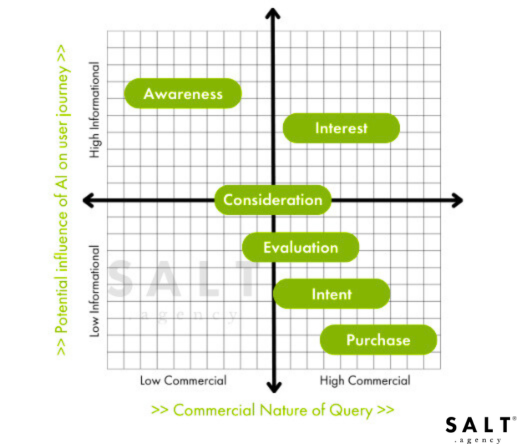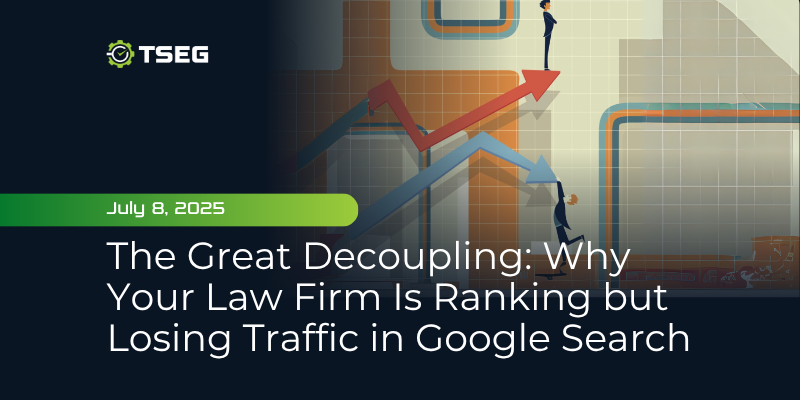The Great Decoupling: Why Your Law Firm Is Ranking but Losing Traffic in Google Search
Posted on Tuesday, July 8th, 2025 at 3:01 pm
More Visibility, Fewer Clients
Something has changed in Google Search, and law firms are feeling the effects. Your website might be showing up more often when people search for legal help, yet fewer are clicking through.
This growing gap between how often your firm appears and how often someone visits your site is now being called The Great Decoupling. It addresses a rising pattern where high search engine rankings don’t lead to the same level of engagement as before. In short, an increase in rankings does not guarantee the same increase in traffic as before.
We’ve seen this take shape across multiple law firm websites throughout 2025. Search positions have remained stable, but traffic has dropped. That disconnect has nothing to do with content quality or technical issues. It comes down to how Google is delivering answers.
When search behavior changes, so does the role of your website in client intake. If your firm is still measuring SEO performance by traffic alone, it’s time to look deeper at what’s actually working and where opportunities are being lost.

AI Overviews Are Cutting Into Your Clicks
Google now answers many legal questions directly on the results page via AI Overviews. These responses collect information from multiple websites and display it in a way that often removes the need to visit a source.
For law firms, this creates a clear problem. Pages still appear in search, but the user might never leave Google. When that happens, your impression is recorded, but your site traffic takes the hit.
This affects the types of queries that have traditionally supported discovery. Informational searches like “How long does a personal injury case take?” or “Steps after a car accident in Texas” are common starting points for potential clients. These are now being answered before a user ever clicks.
Content that explains legal processes, defines key terms, or walks through what to expect is still valuable for legal content strategies moving forward – especially for SEO campaigns aiming to rank your site in AI search results. However, it appears that now this kind of content is less likely to produce a click since the content is mostly visible on the results page.
Not every search is affected. Queries that include a city name, your firm’s brand, or show clear intent to hire still lead to website visits. But the top half of the funnel has changed. Users get what they need earlier, and your chance to make an impression comes and goes faster.
What Your Analytics Are Telling You
Law firms reviewing performance in Google Search Console may notice their pages ranking more often while clicks continue to fall. This is The Great Decoupling in action. Your firm is visible in SERPs, but fewer people are clicking through. That isn’t a ranking problem. It reflects how Google now delivers information to users.
In Google Analytics 4, engagement metrics like session length and conversion rates may look stronger because visitors who do reach your site are more qualified. That can create the impression that things are improving, even while your audience is shrinking. This is why it’s important to compare what you see in both platforms.
Attribution becomes less clear. A user might see your firm in an AI Overview, leave without clicking, and return to your site later. That visit could be logged as direct traffic, or not tracked at all. You lose the ability to connect the first search to the converting action.
To get a full picture, law firms need to review both Search Console and GA4 together. One reflects how often you appear. The other shows what happens after.

Proven Content Strategies That Still Work
With traditional clicks dropping, law firms are focusing on the parts of their content strategy that still drive results. It starts with becoming recognizable before the search even happens.
When users search for a firm by name, Google is less likely to serve an AI Overview at the top. These searches tend to produce real visits, and the click-through rate remains steady. Building name recognition through referrals, strong reviews, and offline impressions can improve your results across search. This approach has not changed.
Next is the quality of your content. Pages built from general legal information are easy for AI tools to summarize. What still works are pieces that include your firm’s personal insight, your firsthand experience, or data that is not found elsewhere.
Law firms are seeing results from formats like:
- – Case results that highlight unique legal outcomes
- – In-depth comparisons that explain options clearly
- – Client stories told with permission
- – Original commentary on recent legal developments
- – Interactive tools or calculators specific to a practice area
In addition to what you publish, how it’s organized matters. Writing around connected topics shows that your site has depth. Instead of focusing on a single keyword, build out clusters of related questions and answers. This helps users explore more than one page, and it gives Google a reason to keep surfacing your content.
Lastly, turn high-traffic pages into real decision-making tools. Add resources that help users evaluate their situation and understand what your firm can offer. This includes FAQs, testimonials, short guides, comparison tables, or explainers written in plain language.
These adjustments make it harder for Google to replace your page with a summary, and increase the chances your site takes over the AI Overview. They also give your firm more chances to make a lasting impression, even if fewer visitors reach your site.
Why Search Still Matters and What to Do Now
AI may be changing how people interact with Google, but it still depends on reliable sources to generate responses. Your firm’s content helps power the answers, even when the user never clicks. That makes visibility more important, not less.
Traditional listings still play a major role in how potential clients evaluate options. Someone might not visit your site the first time they see it, but repeated exposure builds trust. The name they recognize later is often the one they contact.
Search also continues to drive valuable traffic for legal terms that show clear intent. Queries that include location, practice area, or firm name still perform well. These are the visits that often lead to action, and they remain a core part of any law firm’s digital strategy.
What has changed is how success is measured. Traffic alone no longer tells the full story. Firms should also be watching for signs of recall, such as returning visitors, branded searches, and increased direct traffic over time.
TSEG works directly with law firms to adjust content strategies to meet this new reality. We help firms get in front of real people, not just algorithms. That includes identifying the pages that still perform, building assets AI tools can’t replace, and creating visibility where it counts. If your firm is seeing lower traffic but stable rankings, there’s a path forward and we’re already helping firms take it. Contact us today.
